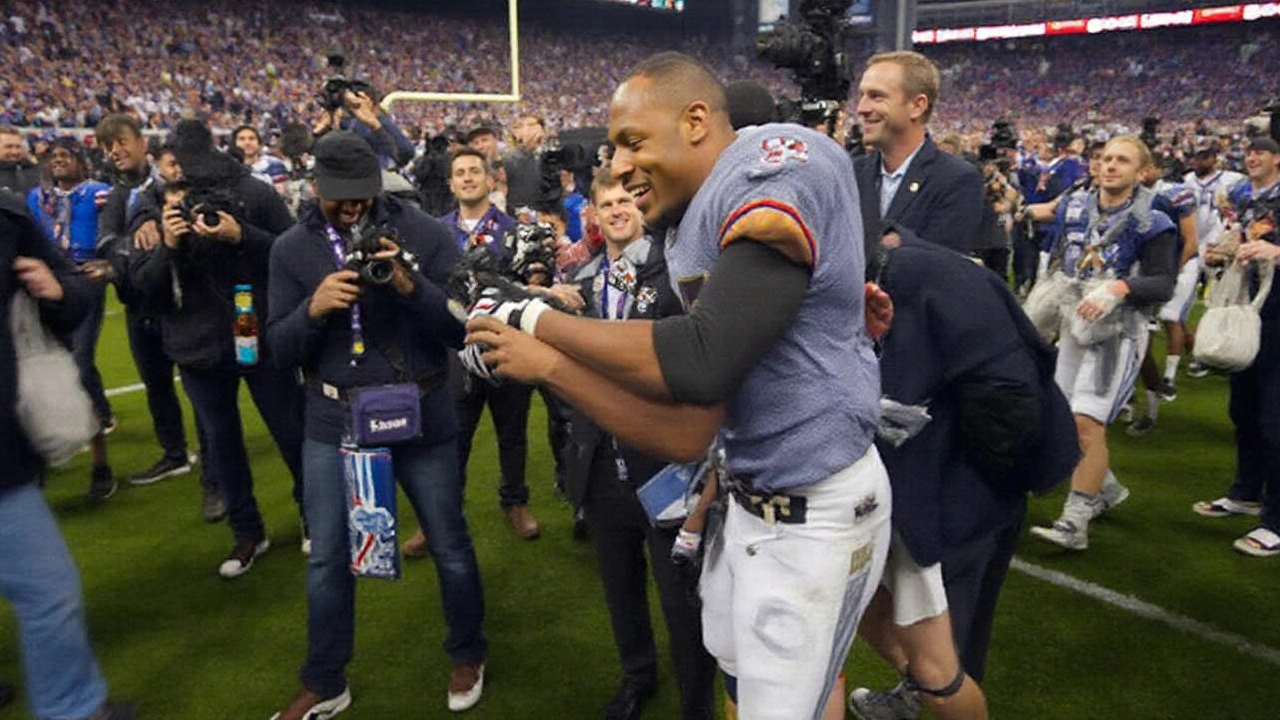A team scored 40 points, ran for 235 yards, and still lost—something the NFL had never seen until Sunday night. The Buffalo Bills beat the Baltimore Ravens 41-40 in a season-opening thriller that flipped from routine to surreal in the final minutes, the kind of prime-time chaos that echoes for months.
Down 15 midway through the fourth, Buffalo refused to crack. The Bills clawed back, seized a late turnover, and pieced together a calm, clinical drive that ended with veteran kicker Matt Prater knocking home the go-ahead field goal in the final moments of his first game in a Bills uniform. Baltimore had dictated almost everything for three quarters, yet walked off stunned.
The first act belonged to Derrick Henry and a Ravens ground game that looked like a sledgehammer. Henry ripped through arm tackles, finished runs with force, and rumbled for 169 yards and two touchdowns. His 46-yard burst with 11:42 left felt like the dagger, pushing Baltimore ahead 40-25 and setting the table for the Ravens to drain the clock on the back of their bell cow.
Lamar Jackson played his part, too. He accounted for three touchdowns—two through the air—and guided an offense that scored on seven of its first eight possessions. The Ravens were balanced, explosive, and brutally efficient. For most of the night, Buffalo didn’t have many answers.
Then everything changed on one snap. With 3:06 remaining, defensive tackle Ed Oliver chopped at the ball and jarred it loose from Henry. Buffalo fell on the fumble, and the building air completely flipped. Less than two minutes later, Josh Allen powered across the goal line on a 1-yard keeper to cut it to 40-38. Baltimore’s offense, unstoppable for hours, went three-and-out on the next possession, and Allen got the ball for a final drive that ended in a nerveless Prater kick.
Allen’s final line—33-of-46 for 394 yards and two passing touchdowns, plus the late short-yardage score—underscored why no lead is safe when he has time and a rhythm. The win was his 77th as a starter, tying Joe Ferguson for second on the Bills’ all-time list. The night belonged to Henry for so long, but Allen had the last word.
Make no mistake, Baltimore’s statistical profile should have won this game nine times out of ten. Yet the Ravens became the first team on record to lose while putting up 40-plus points and rushing for 235 or more. The sport is cruel like that: one fumble, one defensive stand, one quarterback who thrives in chaos—and history flips.
Buffalo’s defense was battered by the run, but it delivered the two most important moments of the night: Oliver’s strip at 3:06 and a three-and-out when trailing by two. Those stops were the cracks in a dam that had held for three quarters. Once the pressure burst, the Bills’ tempo offense took over, and Baltimore never regained control.
Prater’s debut was a subplot with big stakes. With Tyler Bass on injured reserve due to hip and groin injuries, the 41-year-old Prater stepped into a pressure cooker and looked steady. Operation clean. Timing crisp. And when it was time for him to swing his leg with the game in the balance, he delivered.
For the Ravens, the postgame mood matched Lamar Jackson’s blunt assessment: “You just got to finish the game. It’s not over until there is zero, zero, zero on the clock. And we found that out tonight.” Baltimore did so much right, but left the door cracked. Against Allen, that’s a mistake you rarely survive.
- Henry’s night: 169 rushing yards, two touchdowns, and the 46-yard sprint that made it 40-25 with 11:42 left.
- Allen’s surge: 394 passing yards, two through the air, plus the 1-yard score that made it a two-point game.
- Defining turnover: Ed Oliver’s strip of Henry at 3:06, the pivot point of the entire game.
- Historic footnote: Ravens are the first team to lose while scoring 40+ and rushing for 235+.
A 15-point hole, erased in 10 minutes
Here’s how the end unraveled. After Henry stretched the lead to 15, Buffalo’s offense shifted into warp speed. Quick snaps, simple reads, and chunk gains through the middle of the field trimmed the deficit. The Ravens traded time for cushion, but once the cushion vanished, the clock became the Bills’ ally.
Buffalo had already pulled within one possession when Oliver dislodged the ball from Henry. In those moments, you could feel the Bills’ sideline steady. No panic. No wasted motion. Allen got the next drive on the Ravens’ side of midfield and hammered through red-zone snaps, finishing with the 1-yard keeper to make it 40-38. The call was straightforward: trust a 240-pound quarterback to win a yard with the season opener on the line.
That’s where the defense had to make a stand, and it did. Baltimore faced a manageable down-and-distance but couldn’t punch out a first down. Buffalo kept its edges disciplined, filled interior gaps, and forced the punt that set up the last drive.
Allen then went into his late-game routine: patient on early downs, decisive on third. He worked the underneath throws, moved the chains, and avoided the catastrophic mistake. The Bills didn’t chase a hero ball; they trusted the structure, bled the clock, crossed the line to a comfortable kicking range, and let their new specialist handle the final swing.
Situational football won the night. Baltimore’s dominance on early downs meant less than Buffalo’s mastery of the sequence that truly mattered: turnover, touchdown, stop, game-winning kick. That four-step chain decided everything.

What this game tells us about both teams
Buffalo showed the trait that separates playoff teams from the pack: composure under duress. The Bills have erased fourth-quarter deficits before, but doing it on the road in prime time against a physically punishing opponent is a different kind of statement. This was the franchise’s fourth such rally from at least 15 down in the fourth quarter, and it felt like a team that understands who it is in tight moments.
Allen’s command late was the difference. He didn’t force throws into traffic, he took free access completions, and he used his legs only when the leverage was obvious. The offensive line settled after a rugged first half, and protection held up during the two drives that mattered most. You could hear it in the locker room afterward: “No one blinked.” That mindset traveled.
Defensively, the Bills will spend the week cleaning up their run fits. Henry got downhill far too easily for too long, and that won’t fly against the AFC’s better rushing teams. But in the biggest moments, they found answers—Oliver’s punch-out, strong edge setting, and a coverage unit that denied the kind of explosive pass that would have ended the game.
For Baltimore, the loss cuts deep because so much else looked right. The Ravens’ run-game marriage with Henry is as advertised: downhill, punishing, clock-chewing. Jackson looked comfortable toggling between designed runs and quick-game throws, and the offense set a physical tone from the opening series. This blueprint will win in January if they close games.
But finishing is a habit, and it’s built in details. Ball security in four-minute offense. First-down efficiency when everyone knows you’re running. Defensive communication when the opponent flips tempo. On Sunday night, the Ravens missed those small edges, and Allen turned every crack into a window.
There were individual milestones tucked inside the chaos. Allen’s 77th win ties him with Joe Ferguson for second on the Bills’ all-time list—a stat that nods to sustained excellence. Prater’s seamless debut matters too. With Bass sidelined, Buffalo needed an adult in the room for close-and-late kicks; they got one.
If you’re searching for takeaways beyond the box score, start here: when a game shrinks to a handful of snaps, quarterbacks and turnover luck decide the outcome more often than not. Baltimore owned the night until it didn’t. Buffalo hung around long enough to roll out its closing lineup—and then slammed the door.
File this one under games that shape how a season feels. The Bills vs Ravens opener checked every box: star power, wild swings, and a finish that left both sidelines breathless. One team learned it can rally from anywhere. The other learned no lead is safe until the clock reads nothing but zeros.
